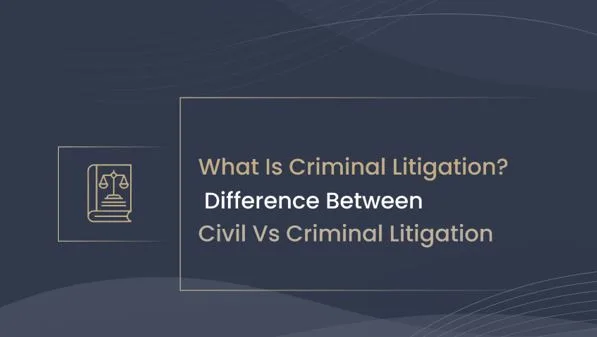Civil vs. Criminal Litigation in India: Everything You Need to Know
India’s legal system is divided into two primary branches — civil and criminal litigation. The two involve conflict and are different in process, intent, and result. According to the National Judicial Data Grid, there are more than 4.4 crore pending cases in Indian courts. There are around 77 percent of them under civil and criminal law.
These two types of litigation are important to understand for every individual who finds themselves involved in a legal matter. Either in pursuing compensation or addressing a crime, gaining a few ideas of how it works lends itself to making informed decisions.
This blog explores what criminal litigation is, compares it with civil litigation, and explains key differences with real-life examples.
What is Criminal Litigation?
Criminal litigation refers to the legal process where the state prosecutes an individual or entity for committing a crime. Offenses are regarded as crimes against society, not only against individuals.
Key highlights:
- The criminal cases are normally instituted by the state or the police.
- It is not to compensate the victim, but it is aimed at punishing the accused.
- There exist penalties which are prison, fines, or both.
- A case has to exceed the doubt of guilt.
Some of the typical criminal offenses are:
- Kidnapping, theft, and murder
- Rape and abuse at home
- Financial fraud, cyberexploitation, and graft
India subscribes to the Indian Penal Code (IPC) as a way of defining crimes related to their punishment. The procedures for conducting criminal cases are covered under the Criminal Procedure Code (CrPC).
What is Civil Litigation?
Civil litigation is the court proceedings over a conflict that exists between two or more persons or entities. Unlike criminal litigation, it does not involve state prosecution. The criteria here are conflict resolution and offering reparations or compensation, but not punishment.
Key characteristics:
- Not the state, but individuals or companies file it.
- Sues to recover damages, injunctive relief, or specific performance.
- Does not send you to prison.
- The burden of proof is “preponderance of probability.”
Typical civil litigation cases:
- Family and property litigation.
- Violating the contract and complaining about the services.
- Cases of consumer protection and intellectual property.
The Civil Procedure Code in India (CPC) regulates civil cases.
Key Differences Between Civil and Criminal Litigation
Understanding the civil vs criminal litigation divide is crucial in identifying how the Indian legal system works. These are the main differences:
| Feature | Civil Litigation | Criminal Litigation |
| Nature of Dispute | Between individuals/parties | Against society (the state prosecuted) |
| Purpose | Compensation/remedy | Punishment of the offender |
| Initiated by | Private party (plaintiff) | State or police (prosecution) |
| Standard of Proof | Preponderance of probability | Beyond a reasonable doubt |
| Burden of proof | On the plaintiff | On the prosecution |
| Penalties | Compensation, orders | Jail, fines, or both |
| Appeal Process | Can be appealed in civil court | Can go up to the High Courts/Supreme Court |
| Legal Representation | Optional but recommended | Usually mandatory and often state-provided |
While both fall under Indian law, they serve distinct legal objectives. A party can be both personally and criminally liable for the same action. In other words, an assault could result in incarceration and cash restitution.
Examples of Civil and Criminal Cases in India
To better understand civil vs criminal litigation, let’s explore real-world Indian case examples:
Examples of civil cases:
- Property Controversies: Two brothers squabble over the land that their father left them.
- Breach of Contract: Non-delivery of goods or services to a vendor who has been paid.
- Divorce and the custody battles: Family issues.
- Consumer Protection: A defective product sold under warranty.
Criminal Case Examples:
- Asleep stealing: Smashing into a house and stealing stuff.
- Murder: killing a person to commit the offence.
- Cybercrime: Breaking into a bank’s account.
- Corruption (Prevention of Corruption Act): Accepting bribes by a government official.
As these illustrations reveal, the nature of wrongfulness determines the civil or criminal nature of any case. When it comes to both victims and perpetrators, some instances might be deemed as both concurrently, like in a fraud when the victim reports to the criminal law and also offers a lawsuit for financial loss.
Why It’s Important to Know the Difference?
Knowing the difference between civil vs criminal litigation is essential for:
- Choosing the right legal action: Filing a criminal case when only a civil dispute exists may delay justice.
- Getting the best lawyer: The specialisation in each form of litigation is unique. Consult a law firm in Chandigarh with experience in both fields.
- Understanding possible outcomes: When there is a criminal case, punishment is expected. In civil cases, demand compensation or a decree.
- Getting ready for the legal procedure: Criminal litigation tends to be more complex, involving police, FIRs, charge sheets, and court hearings. Civil litigations are normally document-reliant but less confrontational.
- Defending your rights: Knowing what is criminal litigation helps safeguard rights — whether you’re an accused, victim, or witness.
- Cost and time scheduling: Public cases can be dragged over a long period of time, whereas the process is rapid with criminal cases because of state involvement and urgency.
- Staying out of legal mistakes: Confusion of the two may result in inappropriate filing, resource loss, and dismissal of the cases.
When in doubt, consult the best criminal lawyer in Chandigarh or your city to identify the correct legal route.
Conclusion
Understanding what is criminal litigation and how it differs from civil litigation is crucial in India’s justice system. These two processes cover various forms of evil, and they are directed at different outcomes. While criminal litigation deals with punishing crime, civil litigation aims to resolve disputes and offer remedies.
The option of legal choice is much more crucial in the current time, when millions of cases are waiting to be heard. Whether handling any kind of legal dispute, one is advised to seek the consultation of a trusted legal expert. Clear awareness of civil vs criminal litigation helps in navigating the legal system confidently and efficiently.





